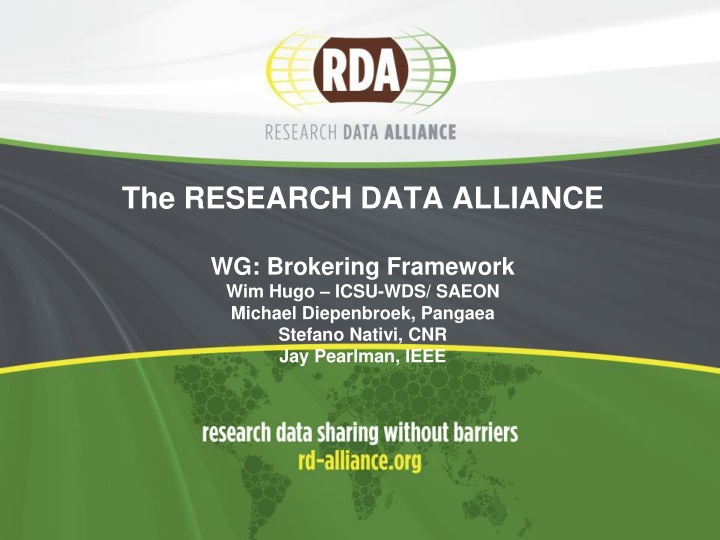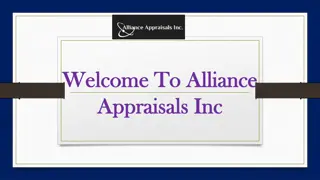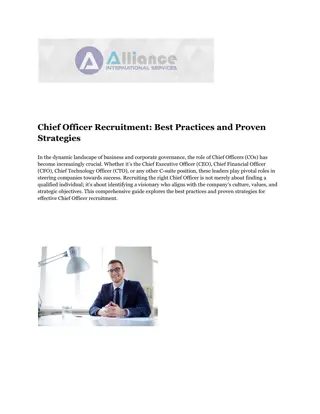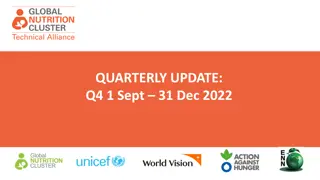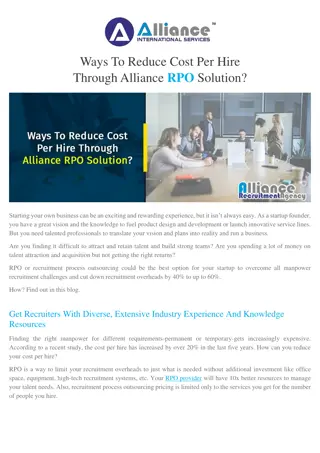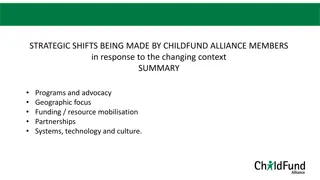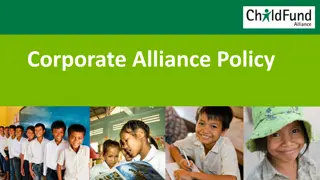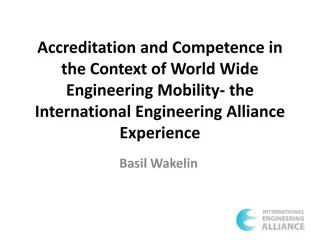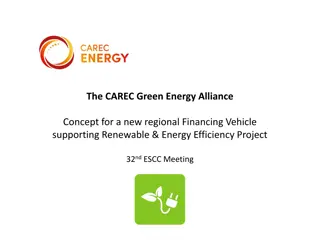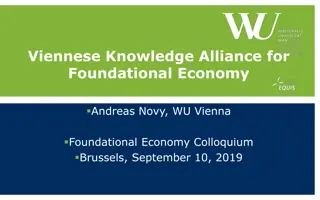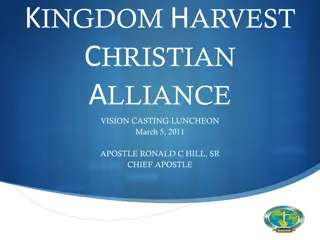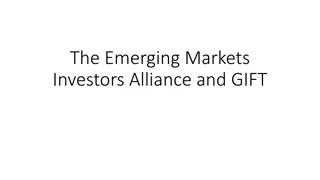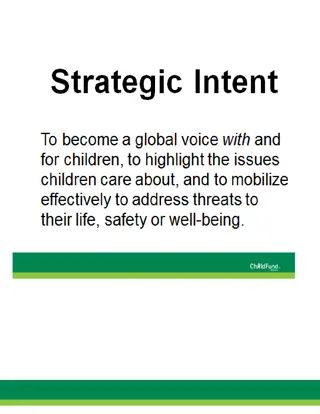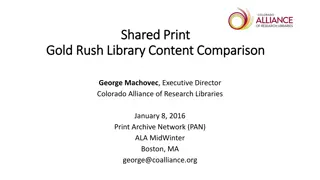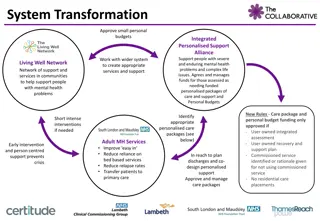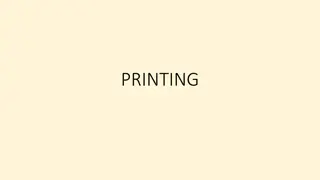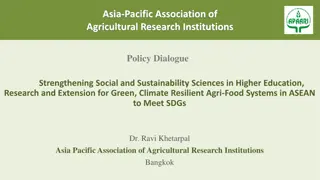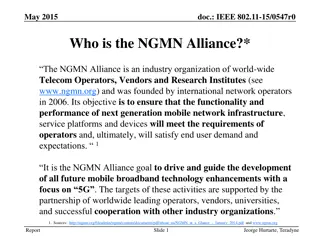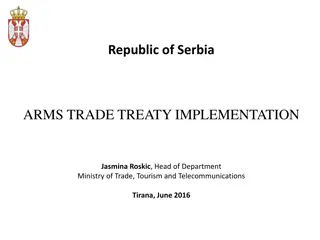Enhancing Data Brokering Framework in Research Data Alliance
The Research Data Alliance Working Group focuses on developing a Brokering Framework to improve data publication, discovery, and mediation across various disciplines. The group aims to address challenges related to diverse service protocols, content standards, and brokering technologies. Their vision is to create a standardized framework for describing, discovering, and invoking brokering components. Key objectives include establishing a prototype registry, defining mediation components for interoperability, and testing mediation alternatives to support universal mediation capabilities in data systems.
Download Presentation

Please find below an Image/Link to download the presentation.
The content on the website is provided AS IS for your information and personal use only. It may not be sold, licensed, or shared on other websites without obtaining consent from the author.If you encounter any issues during the download, it is possible that the publisher has removed the file from their server.
You are allowed to download the files provided on this website for personal or commercial use, subject to the condition that they are used lawfully. All files are the property of their respective owners.
The content on the website is provided AS IS for your information and personal use only. It may not be sold, licensed, or shared on other websites without obtaining consent from the author.
E N D
Presentation Transcript
The RESEARCH DATA ALLIANCE WG: Brokering Framework Wim Hugo ICSU-WDS/ SAEON Michael Diepenbroek, Pangaea Stefano Nativi, CNR Jay Pearlman, IEEE
Agenda Welcome and Context: Brokering Interest Group J Pearlman (10min) Review of Case Statement W Hugo (20 min) Existing Brokers - Background: GI-CAT: S Nativi (20 min) OpenAire: M Diepenbroek (20 min) Questions and Inputs W Hugo (20 min) Work Programme and Milestones W Hugo (15 min) Open Discussion (15 min)
Diversity Familiar to All Multiple service protocols Multiple content standards for data and meta-data Multiple vocabularies and ontologies Multiple brokering approaches/technologies for mediation exist which are largely incompatible Project-driven limitations leads to lack of sustainability, loss of expertise, code, and infrastructure
Vision and Mission Vision To describe, develop, test, and implement a Brokering Framework that allows publication, discovery, and invocation of brokering and mediation components in a standardised manner. Mission Community consensus on the way in which brokering and mediation components are described, discovered, and invoked, based on real use cases Brokering Framework leading to a formal service and content standard. The formalisation of the standard is an external process and may involve participants in the working group, but is not a task for the working group; Demonstrating the value of the framework by developing, testing, and commissioning a reference implementation of a brokering and mediation registry.
Address the Need Define a description schema for services, vocabularies, ontologies, content standards, and mediation components that allow services and clients to be matched. Establish a prototype registry based on the above. Describe a collection of mediation components that can interoperate through well-defined existing interface specifications and applicable standards to support implementation of a universal mediation capability, and populate the registry with a base set of these. Define a test bed environment for testing interoperability of mediation alternatives leading to recommendations for application areas. The focus will be on meta-data and data brokering across data systems that address different disciplines and scopes.
Value Proposition: Common Implementation Architecture Curate? Mediate? Cite? Access/? Download? Data/? Services? Analise/? Visualise? Bind ? Publish ? Process? Assess/? Rate? Metadata? Discover? Find ? Predictable? Assembly? from? Reliable? Components ? ?
Mediation Functions to be Supported Discovery and access including harvesting and synchronous distribution Content transformation for both meta-data and data Content enhancement and Linked Open Data enablement through vocabularies and ontologies Application to popular protocols and service definitions
Who are the End Users? RDI Implementations Portal Builders Data Centres/ Repositories Science Publishers Service Providers Ontology and Vocabulary Services
Methods Contributions from members in respect of current working components and use cases, through regular working group meetings. Such meetings will be held every 2 months, and aligned with RDA Plenary Meetings. In-kind development contributions. Provisionally, this will include work in process by SAEON.
Practical Outcomes Confirmation of the elements of a brokering framework: component description standards, registry specifications A community consensus, achieved via RDA working group efforts, to develop and publish a brokering and mediation component description standard that can be used as the basis of a registry of such components. Community consensus on the capabilities (service methods) of a registry: allowing discovery and description of a brokering and mediation component. A shortlist of important components that are currently operational will be obtained with community assistance, and populated in the registry. Testing the registry in the context of real-life applications
Work Plan: Main Tasks Confirm use cases and examples of brokering mediation, with a view to classifying them and developing a conceptual model for description of components. Identify and supplement content and service standards for a registry of brokering and mediation components heavy emphasis on RDA outputs and work in progress. Create and populate a prototype registry of mediation options that allow components to be shared and improved. Create a test environment to prove capabilities. Test and evaluate. Consider governance of the registry and the test environment in collaboration with the Brokering Governance Working Group.
Deliverables and Milestones Task? or? Deliverable? RDA? Plenary? Expected? Timelines? Use? cases? and? classification? of? brokering? and? mediation? components? 10? 3? months? Develop? content? and? service? standards? 11? 9? months? Create? a? registry? of? mediation? options? ? 11? 9? months? ? Test? environment? -? initial/third? party? implementation? 12? 12? months? Develop? protocols? for? the? test? environment? 12? 12? months? Contingency? and? slippage? provision? for? the? above:? final? delivery? 13? 15? months? Governance? of? registry? and? test? environment? ? 13? 15? months? Recommendations? and? report? 15? 18? months? ?
Existing Work ESSI Lab EarthCube OpenAire panFMP SAEON/ DIRISA SAEON Test Bed Vocabularies Visualisations Harvesters
Some Practical Questions Open framework allows one or more implementations/ instances based on the framework. How do we describe a broker or mediator? Metadata Capabilities Software and Deployment Platform Do we need formal registries based on the framework? How do we match objects and brokers? Crowdsourcing? Do we need metrics/ qualification for brokers and mediators? Does our registry support services? Automated registration and editing Discovery/ Capabilities
Participants Michael Diepenbroek (PANGAEA) Wim Hugo (SAEON, WDS-SC) Stefano Nativi (ESSI Lab) Jay Pearlman (EarthCube) Paolo Manghi (OpenAIRE) Uwe Schindler (PANGAEA, Apache Software Foundation) Asia-Pacific Health Life Sciences Humanities including social sciences
